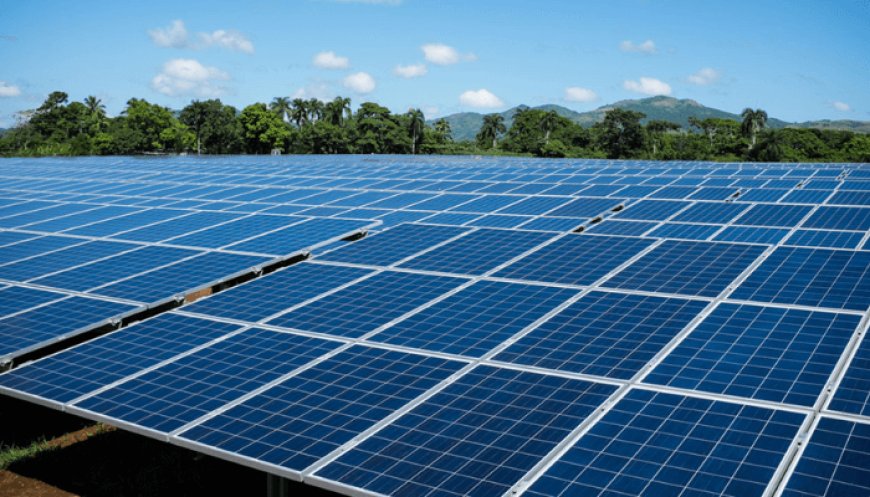Assessing the implications of Nigeria’s ban on solar panel imports

The Federal Government of Nigeria recently announced a policy to halt the importation of solar panels.
This decision is intended to promote local manufacturing, reduce forex pressure, and align with Presidential Executive Order No. 5, which emphasises local content in science, engineering, and technology.
While well-intentioned, this directive has raised significant concerns about the nation’s readiness for such a transition and its potential impact on Nigeria’s clean energy future.
From a policy standpoint, the government aims to stimulate job creation and industrial growth by encouraging local production of solar panels.
By reducing dependency on imports—primarily from China, the U.S., and the EU—the move also seeks to alleviate forex pressure, enhance energy security, and add value to Nigeria’s abundant natural resources, such as lithium used in battery production.
In principle, these objectives reflect long-term national interests.
However, a critical question remains: Is Nigeria industrially prepared to shoulder the demands of nationwide solar adoption without imports?
The readiness gap: What’s at stake
Currently, Nigeria’s solar panel production capacity is modest compared to demand.
Auxano Solar Nigeria Limited, operating in Lagos, runs a 100 MW fully automated PV module assembly facility, Nigeria’s largest.
The National Agency for Science and Engineering Infrastructure (NASENI) is developing a solar cell production plant expected to produce 1,000 tonnes of polysilicon and 50 MW of solar cells annually.
Additionally, under the $950 million DARES project, the country plans to establish a 1.2 GW solar module assembly plant to provide electricity to 17.5 million Nigerians.
These initiatives show promise. However, Nigeria’s installed solar capacity as of 2024 stands at 385.7 MWp, accounting for just 1.6 percent of the national energy mix, despite ranking fourth in Africa for solar adoption.
The demand for solar power solutions remains far higher than current production levels. For context, solar energy imports reached $152 million in the fourth quarter of 2024 alone, highlighting a deep reliance on foreign supply to meet demand.
Risks of a premature import ban
If Nigeria enforces a blanket import ban without bridging this supply gap, several risks could emerge.
A sudden restriction could lead to solar panel shortages, driving up prices and making systems unaffordable for households and businesses.
This, in turn, may reduce the pace of renewable energy adoption and undermine national climate goals, especially in underserved communities where donor-funded projects often depend on competitively priced imports.
Furthermore, without adequate quality control systems in place, there is the danger of low-quality production, particularly if local manufacturers are pressured to scale quickly without sufficient investment in technology, skills, and standards.
Before implementing a full stop to imports, several key areas require urgent attention. Chief among these is aligning production with demand.
With over 200 million Nigerians in need of reliable power, the current manufacturing capacity must be significantly expanded
It is also essential to establish and enforce quality standards to avoid the market being flooded with substandard products. A dependable supply of raw materials like silicon and lithium must be guaranteed to support consistent manufacturing.
Equally, the development of a skilled workforce is critical. Training programmes to develop technicians and engineers capable of operating advanced manufacturing equipment are necessary to maintain high standards.
Lastly, market awareness and consumer confidence must be built through public education and efficient distribution networks to support the uptake of locally produced panels.
Global lessons: India and the U.S.
Other countries offer valuable lessons. For instance, India did not adopt an abrupt ban but implemented a 40 percent tariff on imported solar modules to protect and promote its domestic solar manufacturing industry.
This move was coupled with robust financial incentives such as subsidies, tax breaks, and grants to support domestic production. The strategy allowed India to protect its growing solar industry without disrupting the energy market.
Similarly, the United States has focused on long-term investment in manufacturing infrastructure, backed by legislation like the Inflation Reduction Act, which directs billions into clean energy development without sacrificing short-term access to technology or capacity.
Recommendations for a sustainable transition
To ensure that Nigeria’s policy does not backfire, a more gradual and strategic approach is needed. A phased reduction of imports is more practical than an immediate ban.
This approach will give domestic producers time to scale up operations and ensure that market disruptions are minimised. Expediting the rollout of the planned 1.2 GW solar module assembly plant and supporting the expansion of existing facilities like Auxano’s are also critical.
Financial incentives will play a major role in making this transition successful. Grants for plant development can significantly reduce upfront costs for investors, while access to low-cost credit can ease the financial burden on manufacturers.
Electricity subsidies or preferential pricing for producers will help keep operational costs low, and flexibility in local content requirements could attract foreign original equipment manufacturers (OEMs) to invest in the sector.
Investing in workforce development is another essential component of this strategy.
Without a skilled labour force, Nigeria risks compromising quality in the rush to increase production. Strengthening raw material supply chains, especially for key inputs like lithium and silicon, will be vital to ensure sustainable growth in local manufacturing.
Moreover, government and private sector stakeholders must work together to build consumer trust in local products by implementing and publicising strict quality control measures.
Conclusion: Aligning policy with reality
While the push for local solar panel production is commendable and necessary for long-term industrialisation, Nigeria must avoid the trap of policy overreach without sufficient capacity.
An abrupt stop to imports could do more harm than good—slowing down electrification efforts, increasing system costs, and jeopardising public trust in solar energy.
The government’s goal should not be simply to restrict imports but to create an ecosystem where domestic production becomes naturally competitive and sufficient to meet national needs.
This calls for phased policy action, informed by market data, capacity audits, and industry consultations. Only then can Nigeria transition smoothly into a self-sustaining solar manufacturing hub—one that powers its future without compromising the present.

 admin
admin 


